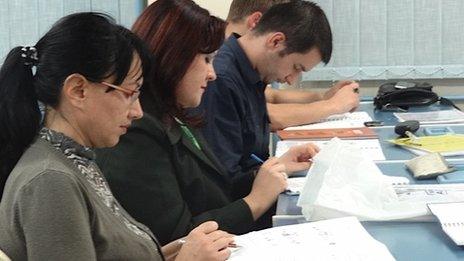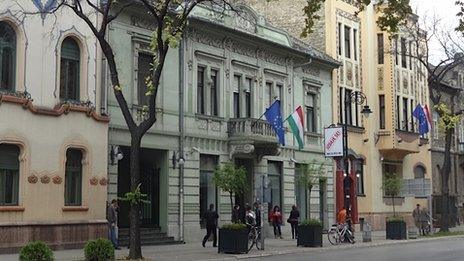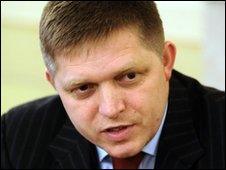Hungary creating new mass of EU citizens
- Published

Many applicants admit their goal is to access the EU jobs market
Hungary has granted tens of thousands of passports to people in neighbouring countries, making them automatic citizens of the EU with all the advantages that brings.
The man leaving the Hungarian consulate looks at me with incomprehension when I greet him in Hungarian.
"He does understand it - he just doesn't speak it very well yet," says his female companion, hastily.
The man clutches a brown folder in his hand, containing his new Hungarian citizenship papers. He took the oath of allegiance to Hungary 15 minutes earlier. Now, they are on their way to take photos, for his first Hungarian passport.
Some 100,000 people have applied for Hungarian citizenship in Serbia, and more than 500,000 worldwide since a new Hungarian law came into force, in January 2011. There are only two conditions - a direct ancestor who was a Hungarian citizen, and a basic knowledge of the language.
Net cast wide
Serbia's northern province of Vojvodina, Transylvania in Romania, Slovakia, and Transcarpathian Ukraine were all parts of Austro-Hungary until 1920, and many parts were briefly re-annexed by Hungary during World War Two.
Therefore most families in the region have a grandparent or great-grandparent who qualifies.
While Romania and Slovakia are already in the EU, the value of a Hungarian passport is inestimable for a Serbian citizen. It is seen as a chance to escape the domestic economic crisis and - regardless of the EU's own deep unemployment - to live and work anywhere in the bloc.

About 100 new Hungarian citizens emerge each day from the Hungarian consulate in Subotica
Serbia's government has accepted the Hungarian law calmly - after all it has its own equivalent, with Serbs in Bosnia able to claim Serbian citizenship.
But others are more nervous about Hungarian motives. The Slovak government passed a law banning dual citizenship, and some politicians accused Hungary of irredentist claims on its former territory.
Fifty-one Slovak Hungarians who claimed Hungarian citizenship have been stripped of their Slovak citizenship, as have several hundred Czechs.
"People ask for Hungarian citizenship for either emotional or rational reasons," explains Hungary's general consul in Subotica, Tamas Korsos.
"The emotional one I need hardly explain - that sense of belonging to a national community. The rational one is that one can travel more easily with a Hungarian passport."
Does he mind the fact that so many are applying who have no emotional connection to Hungary, and simply want to work in Germany or beyond?
He insists that most apply because they identify with Hungary, but adds: "I do not condemn that in any way… everyone looks after his own interests. I look forward to the day when he can travel everywhere with a Serbian passport too!"
No exam
When it passed the new citizenship law, the Fidesz government in Hungary explained that the purpose was to give Hungarians around the world, and especially those in neighbouring countries, the chance to belong to the motherland again.
Domestic critics complained that the new citizens were likely to use their new-found votes to thank Fidesz in next year's elections.
The European Commission has no official comment on the reality of half a million new EU citizens - just as there was no criticism of Romania for inviting Moldovans to take up Romanian citizenship - about 400,000 have already.
In ground-floor rooms at the Subotica consulate, 50 employees work flat out to handle the demand - 800 phone calls a day at the start have hardly slackened.
The soft underbelly of the scheme is the language knowledge. There is no exam, no list of questions - just a requirement that each person who applies "be able to handle their everyday affairs in Hungarian".
The consular staff spend two days a week on the road, visiting villages and towns to popularise the measure. On each occasion, they are presented with a pile of filled out application forms. From the consulate, 100 new Hungarian citizens emerge each day.
Ramadan Sadikovic got Hungarian citizenship last year - and speaks excellent Hungarian. His partner - one of the 252,000 who described themselves as Hungarian in the 2011 census - has just applied. They plan to leave as soon as it comes through. "We'll try our luck in Hungary first, then we'll see," he says.
A woman who just gives her first name, Timea, 38 and her children Orsolya, 21 and Krisztian 19, have already got work to go to - as cleaners on the German-French border, organised by Timea's father who is already there.
The sudden popularity of the Hungarian language - one of the hardest in Europe - has spawned a brisk trade in language schools. Many Hungarians offer teaching over the internet by Skype. One I speak to refuses an interview. "It's too sensitive," she explains.
In a classroom at the Open University in Subotica, Ibolya Farkas is teaching her class. "Some people come to me wanting to learn just enough Hungarian to get their documents," she says, "but I insist they learn the language properly."
Back in the consulate, another batch of new Hungarian citizens sips champagne, as the strains of the national anthem fades.
- Published4 January 2011
- Published12 March 2012

- Published14 June 2017